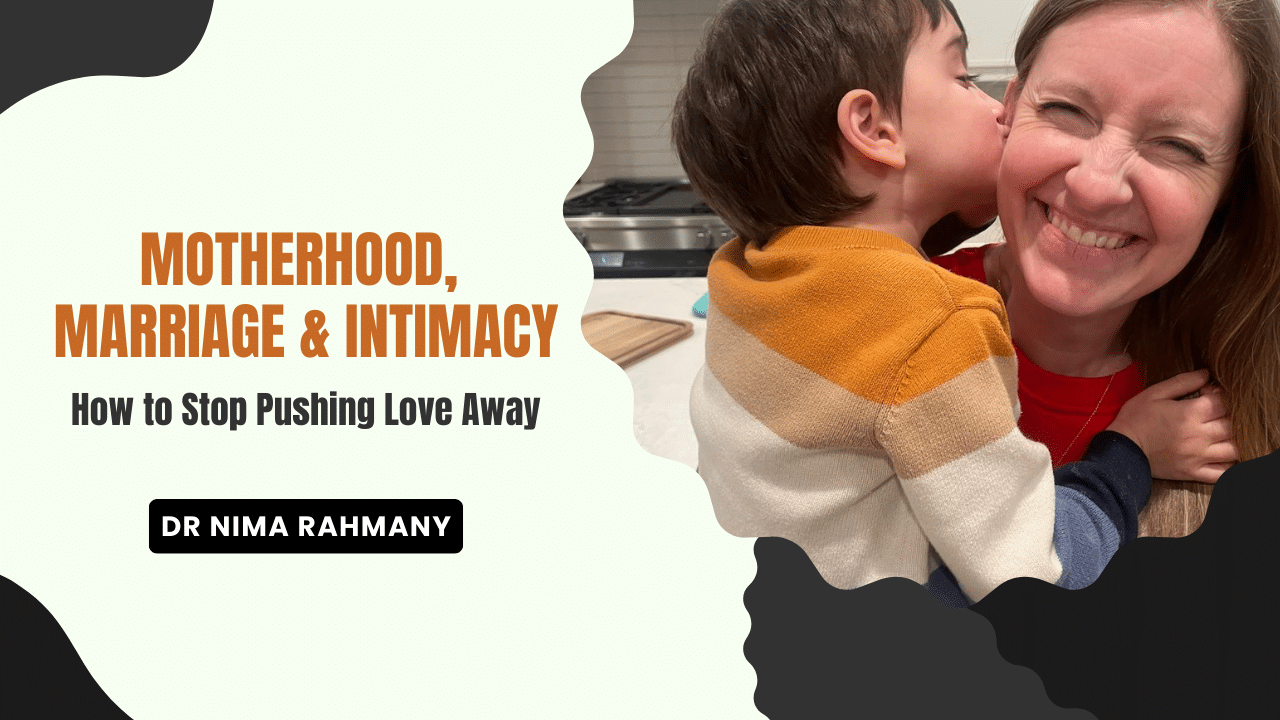As a guide who’s helped hundreds of couples heal the anxious-avoidant dance,
there’s a painful pattern I see come up again and again.
It shows up when a mom,
exhausted and stretched thin,
says “no” to intimacy because she’s just too tired.
It’s understandable.
Between sleepless nights,
overwhelming to-do lists,
and the body changes that make you feel disconnected from yourself,
intimacy can start to feel like one more demand instead of something joyful.
I went through the same challenge with Diana
when Dominic was under 2.
It’s challenging because it leaves
two tired human beings —
with the feeling of not having their needs met.
But here’s the truth that most people can’t see:
Saying no isn’t the problem.
It’s WHY you’re saying no.
The REAL issue is self-rejection.
You’ve rejected yourself long before you ever said “no” to him.
“My body is betraying me”
“I’m ugly”
“I’m the least attractive I’ve ever been”
This is what I hear from the mouths of women
stuck in this dynamic.
And here’s the twist: This isn’t your fault.
No one prepared you for this.
No one told you how the transition to motherhood
would bring up the hidden wounds of your past.
Wounds like:
Feeling like you always had to give to be worthy of love.
Carrying the belief that if you’re not perfect, you’ll be abandoned.
Hating the changes in your body
because they make you feel “less desirable.”
What happens next is heartbreaking but predictable:
When you feel unworthy of receiving love, you push it away.
But to your partner, it doesn’t feel like “she’s tired.”
It feels like rejection.
And here’s where the anxious-avoidant dance begins:
You either have to abandon yourself and sexually
appease— which creates resentment…
Or...
- You withdraw, and he starts to chase.
- He feels rejected, so he gets angry or defensive.
- His reaction confirms your fear that you’re not enough.
- You shut down further to protect yourself.
Round and round it goes.
And this isn’t just about your marriage—
it’s about protecting your family from what happens
when this dance inevitably spirals out of control:
Resentment that builds until one of you wants to leave.
Affairs that start because someone outside the relationship
“makes them feel seen.”
Turning to porn and emotional disconnection to cope.
I’ve spoken to many men and led many men’s groups as well.
This is becoming a silent epidemic.
It’s not your fault,
but it is your responsibility to stop this pattern
before it destroys everything you’ve built.
So, how do you break the cycle?
It starts by healing the part of you that feels unworthy of love.
Because once you feel worthy of receiving,
intimacy stops feeling like an OBLIGATION—
and starts feeling like NOURISHMENT.
Time for a Self-Worth Reset:
Step 1: The Mirror Practice
Stand in front of a mirror every day
and talk to a younger version of yourself—
the part of you that felt unseen, unheard, and not enough.
What’s important here is that she needs to get the message
that she’s worthy-- not for what she provides and gives,
but simply for who she is.
This may be tricky without some help, but it rewires the inner dialogue
that’s been driving the self-rejection.
Step 2: Lean in and ask for help
Most women have been conditioned to believe
that asking for help is weakness.
But what if asking for support from your partner could actually be the bridge to intimacy?
The healthy masculine LOVES to help and be of service.
Instead of withdrawing when you’re overwhelmed,
practice saying:
"I’m feeling overwhelmed right now.
Could you hold me for a few minutes so I can relax?"
You’ll be surprised how often this simple act diffuses tension and invites connection.
Healthy men get turned on by this request.
We are more than happy to provide.
Step 3: Reclaim sex as a nourishing exchange instead of an obligation
If you’ve been conditioned to see intimacy as something extracted from you—
an expectation or duty rather than a source of connection—
it’s time to rewrite that story.
Instead of viewing sex as something you give to fulfill another’s needs,
imagine it as an opportunity to receive love, warmth, and replenishment.
Not about meeting demands;
it’s about allowing yourself to feel cared for and cherished.
Start by reframing your internal dialogue before intimacy:
As you make contact with the parts of you that view sex as an obligation,
begin to make connections with those ignored parts of you:
"I deserve to feel pleasure. I deserve to be adored. I am worthy of receiving."
These small shifts can create massive changes
in how you experience your body, your partner, and your relationship.
You are worthy of love, and you don’t have to earn it.
When you fully understand this,
you’ll see that the anxious-avoidant loop wasn’t about “fixing” your partner—
it was about coming home to yourself.
At the end of the day,
having kids doesn’t have to be an excuse to avoid intimacy.
It’s the very reason why we need it the most.
A nourishing sex life strengthens the bond between partners,
creating a sense of teamwork, safety, and unity that trickles down to the entire family.
A healthy connection between mum and dad isn’t just for them—
it’s a gift that benefits the kids,
showing them what real love, respect, and partnership look like.
If you believe that self-worth and self-connection
are essential foundations for healthy relationships,
you’ll see how shifting this perspective can transform everything.
The more you allow yourself to receive love and pleasure without guilt,
the more you embody your worth—
and in turn, the more aligned and connected your relationship becomes.
Sex is not a task to check off—it’s a vital form of nourishment
for your relationship and emotional well-being.
When you allow yourself to receive without guilt,
you show your nervous system that you are worthy of love and connection.
A nourished partnership doesn’t just benefit you—
it provides the emotional foundation for your children to grow up feeling secure and loved.
At the end of the day, having kids doesn’t have to be an excuse to avoid intimacy.
It’s the very reason why we need it the most.
A nourishing sex life is what keeps the team strong.
A healthy connection between mum and dad
creates a ripple effect that benefits the entire family,
teaching your children how to model loving,
respectful, and secure partnerships in their own lives.
As you take these steps, ask yourself:
What if intimacy wasn’t another obligation but instead an act of self-love and connection?
What if it became the glue that holds not only your relationship
but your family’s emotional foundation together?
When you start seeing it this way, you’re no longer giving to exhaustion.
You’re receiving life itself.
You deserve it.
Your wingman on the adventure,
Nima





